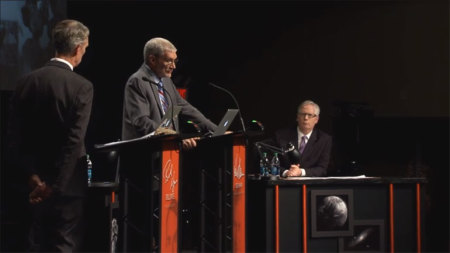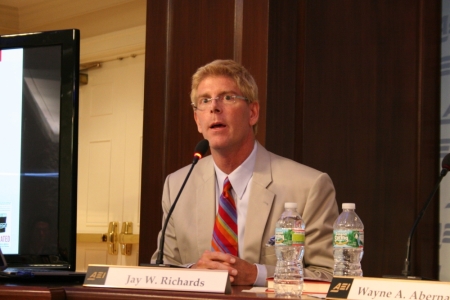5 Christian Arguments Left Out of the Ken Ham, Bill Nye Debate

Christian experts on science explained that there are more than just two perspectives on the relationship between faith and science, articulating a position that neither Ken Ham nor Bill Nye represented in their Tuesday debate at the Creation Museum.
"My objection to the format of the debate, is that it's Ken Ham verses Bill Nye, and I want people to know that there are more options out there," Jack Collins, professor of Old Testament at Covenant Theological Seminary, told The Christian Post in an interview Thursday. Collins, who also served as Old Testament chair on the translation committee for the English Standard Version of the Bible, argued that the most important argument for Christianity and science is not the age of the earth, but the Christian foundations of science itself.
Stephen C. Meyer, director of the Discovery Institute's Center for Science and Culture, and a leading voice of the intelligent design movement, argued that Ken Ham made a grievous tactical error by focusing on the age of the earth rather than the weaknesses of evolution. "Ken Ham has made a very significant mistake by focusing on that subsidiary issue and giving Darwinists a pass on the more significant issue that there is evidence for design," Meyer explained.
Jay Richards, senior fellow at The Discovery Institute, noted, "The target audience was Christians who aren't yet young earth creationists. That's a rhetorical mistake when you're debating somebody like Bill Nye 'The Science Guy.'" Richards is co-author of The Privileged Planet: How Our Place in the Cosmos Is Designed for Discovery.
Below, follow five of the arguments Collins, Meyer, and Richards made to enhance the faith and science debate.
1. The Evidence for Design

"When we focus on the age of the Earth, we lose sight of all the evidence in nature for intelligent design," Richards argued. He listed the information in the cell, the origin of life, "mind, consciousness, our knowledge of moral truths – all of these things weigh in favor of intelligent design or maybe even theism." Richards explained that the complexity of life, and the existence of human reason, seem more likely products of design than random chance.
Meyer agreed. "There is, I think, compelling evidence for intelligent design, and very little of that evidence was proposed in Tuesday night's debate." The intelligent design leader further lamented this failing, saying, "It seems really unfortunate for Ken Ham and others to make the young earth not only a point of orthodoxy but also the main argument they present the secular world which is wondering whether or not there is any evidence of design at all."
2. The Weakness of Darwinism
"Just at the time when the standard Neo-Darwinian theory of evolution is on the ropes, we're focusing on this subsidiary issue" of the age of the Earth, Meyer said. He argued that the modern theory of evolution "is in its death throes," referring to his book Darwin's Doubt, which lists the different ways Darwin's theory is failing and how biologists are searching for new theories.
Bio-Chemists "are working on new theories of evolution because they know the mutation mechanism has very little power," Meyer explained. The Neo-Darwinian view, which argued for "an unguided, undirected biological process which presented the appearance of design," is increasingly untenable, which creates a tremendous opportunity for proponents of design, Meyer said.
3. The Bible and Old Earth Creationism
One of Ken Ham's major arguments hinged on a "literal" reading of Genesis 1, that the world was created in six twenty-four hour days. Collins argued that this is not supported by the biblical text.
In Genesis 2, which has traditionally been seen as an expansion of the sixth day of creation, there were no plants on the land until God made it rain. This, Collins explained, is a reference to the climate cycle in Mesopotamia. "You need to have the climate cycle to be in effect for at least one year – that tells you that the creation period is longer than a regular week."
Another problem with the six 24-hour day interpretation is the fourth day. "In day one, you have God saying 'let there be light' and then in day four you have the sun, the moon, and stars," Collins explained. Then there's the issue of God's rest on the days of creation – the Bible scholar argued that this is "an analogical presentation, because God doesn't really get tired and need rest as we do."
Many Christians – especially Ken Ham – argue that no animals died previous to Adam's sin, because Scripture says that death entered the world with sin. But Collins explained that the Bible does not portray animal death as an evil. Rather, it celebrates it in Psalm 104:21, which praises God for giving lions their food. "Biblically, the death of humans is the problem, the death of animals is not."
4. Christianity Supports Science
Collins said if he were given the opportunity to debate Bill Nye, he would start out "by insisting that the Christian faith gives us grounds for scientific enterprise because it assures us that the God who made the world also made our minds so we can understand the world and manipulate it." Christianity presents an understanding of the world uniquely suited for scientific discovery.
Meyer agreed, referring to the history of science. "It is a widely recognized point by leading historians of science that science in its modern form came out of an early Christian milieu that the world would submit itself to rational investigation precisely because the world had been made by a rational creator who had also made our minds," he said. Christians in the late medieval period investigated nature "to figure out how God put it together because they realized God was free and could have made it any number of ways."
5. The Miracle of Life
Collins argued that science should follow wherever the evidence leads. "There certainly seems to be a discontinuity at the beginning of biological life," he claimed, and "nobody in science actually has a better explanation than the idea that something special happened." If Christians call it a miracle, "a biologist doesn't have any grounds to disagree with that."
The gulf between human beings and other animals is similar, the biblical scholar explained. "There is not a chimpanzee or dolphin scientist," he quipped. He argued that the uniqueness of humans – who alone reason, make conscious choices, and investigate nature – is "fantastic" and "should fill us with wonder."
"I would want somebody to understand that I as a Christian think that science is cool," Collins concluded. "God likes it and He wants me to like it."





















